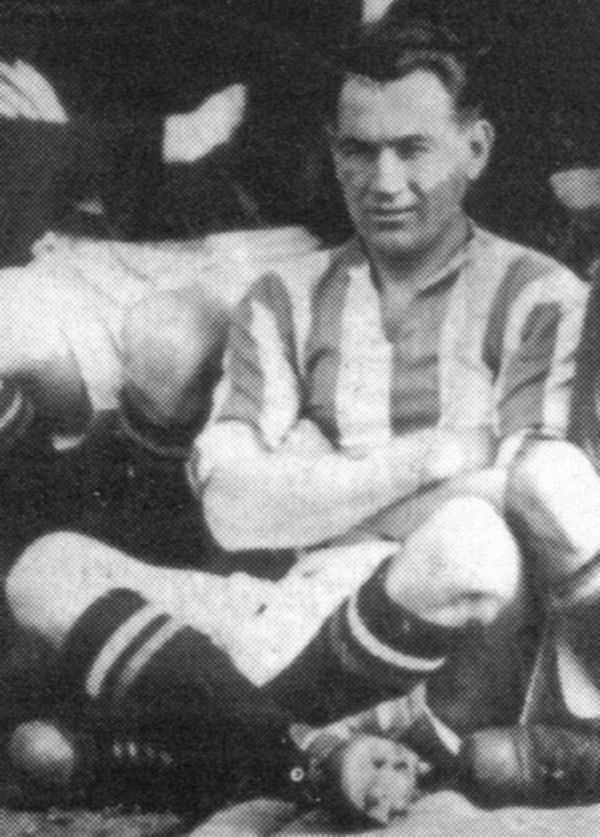
Pictured: Fullam pictured during his time at Leeds Utd FC.
Bob Fullam was born in 1897. He was a naturally brilliant footballer and by the time he was 21 he was playing the game professionally.
Fullam was a forward, an attacking player and an extremely prolific goalscorer, but no lightweight. He had steel and skill, was a fierce competitor and was never bullied out of a game. His youth career began in 1913 with the junior teams St Brendan’s, Olympic and North End. Right from the start, at the age of just 16, he was renowned as a tough, competitive footballer.
In 1918, at the age of 21, he began playing for Shelbourne FC, his local professional club, which was known as the dockers’ club. Fullam spent three successful seasons with the Reds, helping them win the Irish Cup in 1920.
In 1921, he moved to Ringsend’s other top club, Shamrock Rovers, where he really made his name as a powerful footballer, a goalscorer who always played with a hard edge.
Rovers became one of Ireland’s most successful teams, and in Fullam’s second season with the club, they reached the 1922 FAI Cup final, where they faced St James’s Gate. The match finished in a draw, so a replay was scheduled, which took place at Dalymount Park on April 8th in front of a crowd of 10,000. St James’s Gate won this second game, completing the league and cup double.
The match was followed by a brawl between the supporters and players of both teams, which ended only when gunshots were fired in the air. The causes of the disturbances were disputed, but Fullam was blamed for helping to provoke them by repeatedly skirmishing with opposition players during the game. As a result, he was banned for the start of the next season.
When he did return to action, he went on to reach the peak of his playing career. He scored a phenomenal 27 goals in just 22 games, making a vital contribution to Shamrock Rovers’ first ever league title.
It is not surprising that such an impressive goalscoring record, which still stands today, would attract the attention of clubs in Britain. In 1923, he signed for Leeds United FC, who were then in the second tier of the English league.
During Fullam’s first season in Yorkshire, Leeds went on to win the 1923/24 Second Division title, but it was not altogether a successful season for him. Like many a young Irishman before him in an unfamiliar city, he was unsettled and afflicted by homesickness. He was selected for only seven of 42 Leeds league matches and scored just two goals. He returned home to Shamrock Rovers in time for the 1924/25 season.
The reunion proved to be extremely successful, both for Fullam and Rovers. They won the league and cup double in his first season back, and won the league title again in 1927.
In 1926 and 1927, Fullam appeared in the first two international matches played by the Free State (Republic Of Ireland) national team. Ireland lost the first game 0-3. In the second game, a 2-1 defeat by Italy in Dublin, he made history as the scorer of the first-ever goal for the Republic of Ireland, making him the first Irishman to score an international goal at Lansdowne Road Stadium.
As if these achievements weren’t enough, another incident from that historic game sealed his status as a legend. Late in the game, Ireland were awarded a free kick. Fullam stepped forward.
They say Fullam struck the ball so hard that day that poor Mario Zanello, who had the job of standing in Italy’s defensive wall to block the shot, was knocked unconscious by the power of the strike when it hit him. The Irish Independent commended Zanello as “the man who dared to stop Fullam’s shot with his head.” After the incident, the Italian players begged their Irish counterparts, and even pleaded with the referee, to prevent Fullam taking any more free-kicks! Stories are still told of that kick. Poems have been written about that kick!
That match was also Fullam’s last appearance for Ireland. He had passed the age of 30, and was perhaps seen as too old for the international game.
After Rovers had won their 1927 league title, he left the club and tried his luck in the US, playing successfully for clubs in Philadelphia (Irish Philadelphia Celtic, formed by Fullam and other ex-pat Irish footballers) and Detroit (Holley Carburetor).
When he returned to Dublin, and rejoined Shamrock Rovers in 1928, he again starred for the Hoops, winning seven more trophies with them over the next five years, and not playing his last game for the club until 1932, after his 35th birthday. In that final year as a player, he finished in winning style when he helped the club win the League of Ireland Shield.
When he finally hung up his boots as a footballer, he stayed with Shamrock Rovers to become their manager. His success in this role, as he steered them to FAI Cup wins in 1944 and 1945, sealed beyond any shadow of a doubt his status as an all-time great of the club.
Bob Fullam made records and inspired legends.
He was a Ringsend man who played his heart out for both of the great football clubs of the area. He was respected and admired here right up until he died in 1974, and remains so to this day.
By Gavan Bergin



